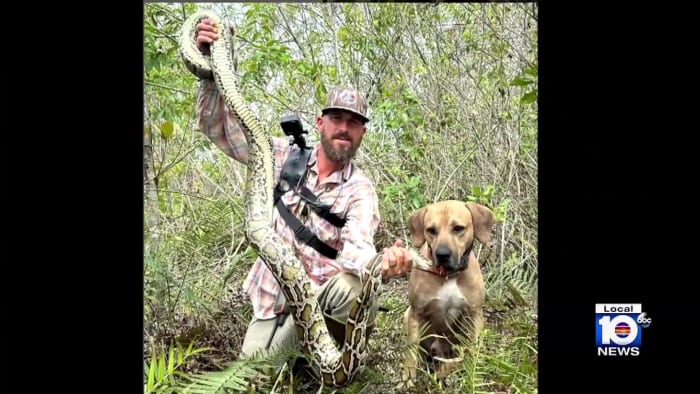Python Cowboy uses hunting dogs to nab pregnant pythons in the ... - WPLG Local 10

The Everglades ecosystem issue of being choked out by pythons has been going on so long that it is now a part of our existing environment.
For the last 20 years, our Sunshine State leaders have tried everything they can to get rid of our massive python problem.
But what if the answer to putting a dent in this snake explosion is to introduce dogs into the equation?
Mike Kimmel is a trapper who is changing the python hunt in the Everglades with hunting dogs.
Kimmel is an outdoors enthusiast who loves to hunt.
"Even growing up as a kid, I had like 15 or even 20 different reptiles, from snakes to lizards to poison dart frogs. I have always been into wildlife and reptiles," he said.
Now a family man with a newborn baby, Kimmel has turned his love of hunting into a business with his number one goal being to remove non-native wildlife that is wiping out all of our native species.
But this savvy hunter has a secret weapon.
"I've come to learn that using the dogs as part of my business is absolutely crucial, especially with these invasive species," he said.
Kimmel may have a crew of five guys, but it's his pack of 20 hunting dogs that are revolutionizing the legal removal of iguanas, geese, gators, hogs and most importantly -- snakes.
But not just any snakes!
"My specific goal this season wasn't so much finding snakes, it was finding these nesting females," he said.
Trapper Mike also goes by the nickname Python Cowboy, because he is removing those gargantuan Burmese pythons from our fragile Everglades not one snake at a time, but one nest full of eggs at a time.
"Finding a nesting female on an active nest was the Holy Grail for me," he said. "There have been only maybe a handful ever found in the state."
Just this nesting season alone, Kimmel is breaking records, finding nest after nest and dens of breeding mama pythons guarding their precious eggs to the tune of 15 female snakes filled with more than 600 eggs over the past several months.
"We're getting these pythons before they have a chance to grow and eat our native wildlife. Everything else that's being caught has already eaten our native wildlife to get to the size that it is," he said.
This is a game changer in the Python Challenge world where the Florida Fish and Wildlife Conservation Commission practically begs hunters to catch the monster snakes in the Everglades that they are destroying every year. But those hunters are not using dogs and they are not focused on the source -- the babies being born.
Otto is Kimmel's number one dog, discovering the majority of those elusive dens.
The hunt is full of technology as Otto wears a GPS tracking collar, where Kimmel can send commands to his dog as he's out there hunting, even if the two are 9 miles apart.
"For him, it's all about the hunt. I always say, 'Otto hunts for Otto.' He's out there, he loves the hunt, he loves capturing," Kimmel said.
But even with 2023 technology and clever tracking dogs, there could be hundreds of thousands of snakes in miles of uninhabited swamp land with those female Burmese pythons laying 50-100 eggs at a time.
"Do you think we could see eradication in our lifetime, because this is our problem?" Local 10′s Jacey Birch asked.
"No, we will never totally eradicate the Burmese python," Kimmel said. "It is here to stay, it is a part of our ecology at this point."
Kimmel says it's more about management than eradication. He's also hoping the state will take notice of how effective it is to use dogs and get behind that movement because right now he is self-funded when it comes to his use of canines.
If you are interested in going out on a hunt with the Python Cowboy or finding out more about what he's doing in his world of wiping out invasive species, visit him on his website, YouTube page or Instagram.
Comments
Post a Comment